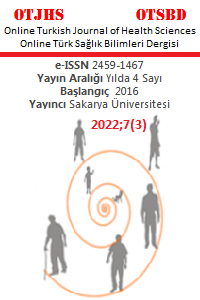Öz
Anahtar Kelimeler
adolesan Hashimoto hastalığı otoimmün hastalık parvovirus B19
Kaynakça
- Mori K, Yoshida K, Ishii K, et al. Experimental autoimmune thyroiditis in human parvovirus B19 transgenic mice. Autoimmunity. 2011;44(6):483-489. doi:10.3109/08916934.2010.547891
- LaFranchi S. Thyroiditis. In: Kliegman RM, Stanton BF, St.Geme III JW, Behrman RE, Schor NF, ed. Nelson Textbook of Pediatrics. 19th ed. Philadelphia, USA:WB Saunders; 2015:1903-1905.
- Zdraveska N, Kocova M. Hashimoto thyroiditis in childhood – review of the epidemiology, genetic susceptibility and clinical aspects of the disease. Maced J Med Sci. 2012;5(3):336-345. doi:10.3889/MJMS.1857-5773.2012.0247
- Cappa M, Bizzarri C, Crea F. Autoimmune thyroid diseases in children. J Thyroid Res. 2010;2011:675703. doi:10.4061/2011/675703
- Heegaard ED, Brown KE. Human parvovirus B19. Clin Microbiol Rev. 2002;15(3):485-505. doi:10.1128/CMR.15.3.485-505.2002
- Koch WC. Parvovirus B19. In: Kliegman RM, Stanton BF, St.Geme III JW, Behrman RE, Schor NF, ed. Nelson Textbook of Pediatrics. 19th ed. Philadelphia, USA: WB Saunders; 2015:1094-1097.
- Broliden K, Tolfvenstam T, Norbeck O. Clinical aspects of parvovirus B19 infection. J Intern Med. 2006;260(4):285-304. doi:10.1111/j.1365-2796.2006.01697.x
- Lunardi C, Tinazzi E, Bason C, Dolcino M, Corrocher R, Pucetti A. Human parvovirus B19 infection and autoimmunity. Autoimmun Rev. 2008;8(2):116-120. doi:10.1016/j.autrev.2008.07.005
- Vejlgaard TB, Nielsen OB. Subacute thyroiditis in Parvovirus B19 infection. Ugeskr Laeger. 1994;156(41):6039-6040
- Krassas GE, Tziomalos K, Pontikides N, Lewy H, Laron Z. Seasonality of month of birth of patients with Graves' and Hashimoto's diseases differ from that in the general population. Eur J Endocrinol. 2007;156(6):631-636. doi:10.1530/EJE-07-0015
- Desailloud R, Hober D. Viruses and thyroiditis: An update. Virol J. 2009;6:5. doi:10.1186/1743-422X-6-5
- Seishima M, Shibuya Y, Suzuki S. Hyperthyroidism associated with human parvovirus B19 infection. Clin Exp Dermatol. 2009;34(7):e439-e440. doi:10.1111/j.1365-2230.2009.03470.x
- Mori K, Munakata Y, Saito T, et al. Intrathyroidal persistence of human parvovirus B19 DNA in a patient with Hashimoto's thyroiditis. J Infect. 2007;55(2):e29-e31. doi:10.1016/j.jinf.2007.05.173
- Lehmann HW, Lutterbüse N, Plentz A, et al. Association of parvovirus B19 infection and Hashimoto's thyroiditis in children. Viral Immunol. 2008;21(3):379-383. doi:10.1089/vim.2008.0001
- Heidari Z, Jami M. Parvovirus B19 infection is associated with autoimmune thyroid disease in adults. Int J Endocrinol Metab. 2021;19(4):e115592. doi:10.5812/ijem.115592
- Wang J, Zhang W, Liu H, et al. Parvovirus B19 infection associated with Hashimoto's thyroiditis in adults. J Infect. 2010;60(5):360-370. doi:10.1016/j.jinf.2010.02.006
- Gravelsina S, Nora-Krukle Z, Svirskis S, Cunskis E, Murovska M. Presence of B19V in patients with thyroid gland disorders. Medicina (Kaunas). 2019;55(12):774. doi:10.3390/medicina55120774
- Tozzoli R, Barzilai O, Ram M, et al. Infections and autoimmune thyroid diseases: parallel detection of antibodies against pathogens with proteomic technology. Autoimmun Rev. 2008;8(2):112-115. doi:10.1016/j.autrev.2008.07.013
Öz
Anahtar Kelimeler
adolescent autoimmune diseases Hashimoto disease parvovirus B19
Kaynakça
- Mori K, Yoshida K, Ishii K, et al. Experimental autoimmune thyroiditis in human parvovirus B19 transgenic mice. Autoimmunity. 2011;44(6):483-489. doi:10.3109/08916934.2010.547891
- LaFranchi S. Thyroiditis. In: Kliegman RM, Stanton BF, St.Geme III JW, Behrman RE, Schor NF, ed. Nelson Textbook of Pediatrics. 19th ed. Philadelphia, USA:WB Saunders; 2015:1903-1905.
- Zdraveska N, Kocova M. Hashimoto thyroiditis in childhood – review of the epidemiology, genetic susceptibility and clinical aspects of the disease. Maced J Med Sci. 2012;5(3):336-345. doi:10.3889/MJMS.1857-5773.2012.0247
- Cappa M, Bizzarri C, Crea F. Autoimmune thyroid diseases in children. J Thyroid Res. 2010;2011:675703. doi:10.4061/2011/675703
- Heegaard ED, Brown KE. Human parvovirus B19. Clin Microbiol Rev. 2002;15(3):485-505. doi:10.1128/CMR.15.3.485-505.2002
- Koch WC. Parvovirus B19. In: Kliegman RM, Stanton BF, St.Geme III JW, Behrman RE, Schor NF, ed. Nelson Textbook of Pediatrics. 19th ed. Philadelphia, USA: WB Saunders; 2015:1094-1097.
- Broliden K, Tolfvenstam T, Norbeck O. Clinical aspects of parvovirus B19 infection. J Intern Med. 2006;260(4):285-304. doi:10.1111/j.1365-2796.2006.01697.x
- Lunardi C, Tinazzi E, Bason C, Dolcino M, Corrocher R, Pucetti A. Human parvovirus B19 infection and autoimmunity. Autoimmun Rev. 2008;8(2):116-120. doi:10.1016/j.autrev.2008.07.005
- Vejlgaard TB, Nielsen OB. Subacute thyroiditis in Parvovirus B19 infection. Ugeskr Laeger. 1994;156(41):6039-6040
- Krassas GE, Tziomalos K, Pontikides N, Lewy H, Laron Z. Seasonality of month of birth of patients with Graves' and Hashimoto's diseases differ from that in the general population. Eur J Endocrinol. 2007;156(6):631-636. doi:10.1530/EJE-07-0015
- Desailloud R, Hober D. Viruses and thyroiditis: An update. Virol J. 2009;6:5. doi:10.1186/1743-422X-6-5
- Seishima M, Shibuya Y, Suzuki S. Hyperthyroidism associated with human parvovirus B19 infection. Clin Exp Dermatol. 2009;34(7):e439-e440. doi:10.1111/j.1365-2230.2009.03470.x
- Mori K, Munakata Y, Saito T, et al. Intrathyroidal persistence of human parvovirus B19 DNA in a patient with Hashimoto's thyroiditis. J Infect. 2007;55(2):e29-e31. doi:10.1016/j.jinf.2007.05.173
- Lehmann HW, Lutterbüse N, Plentz A, et al. Association of parvovirus B19 infection and Hashimoto's thyroiditis in children. Viral Immunol. 2008;21(3):379-383. doi:10.1089/vim.2008.0001
- Heidari Z, Jami M. Parvovirus B19 infection is associated with autoimmune thyroid disease in adults. Int J Endocrinol Metab. 2021;19(4):e115592. doi:10.5812/ijem.115592
- Wang J, Zhang W, Liu H, et al. Parvovirus B19 infection associated with Hashimoto's thyroiditis in adults. J Infect. 2010;60(5):360-370. doi:10.1016/j.jinf.2010.02.006
- Gravelsina S, Nora-Krukle Z, Svirskis S, Cunskis E, Murovska M. Presence of B19V in patients with thyroid gland disorders. Medicina (Kaunas). 2019;55(12):774. doi:10.3390/medicina55120774
- Tozzoli R, Barzilai O, Ram M, et al. Infections and autoimmune thyroid diseases: parallel detection of antibodies against pathogens with proteomic technology. Autoimmun Rev. 2008;8(2):112-115. doi:10.1016/j.autrev.2008.07.013
Ayrıntılar
| Birincil Dil | İngilizce |
|---|---|
| Konular | Sağlık Kurumları Yönetimi |
| Bölüm | Araştırma Makalesi |
| Yazarlar | |
| Erken Görünüm Tarihi | 29 Ağustos 2022 |
| Yayımlanma Tarihi | 1 Eylül 2022 |
| Gönderilme Tarihi | 8 Haziran 2022 |
| Kabul Tarihi | 1 Ağustos 2022 |
| Yayımlandığı Sayı | Yıl 2022 Cilt: 7 Sayı: 3 |
Bu, Creative Commons Atıf Lisansı (CC BY-NC 4.0) şartları altında dağıtılan açık erişimli bir dergidir. Orijinal yazar(lar) veya lisans verenin adı ve bu dergideki orijinal yayının kabul görmüş akademik uygulamaya uygun olarak atıfta bulunulması koşuluyla, diğer forumlarda kullanılması, dağıtılması veya çoğaltılmasına izin verilir. Bu şartlara uymayan hiçbir kullanım, dağıtım veya çoğaltmaya izin verilmez.



